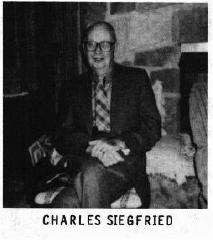Charles Siegfried, Worker of the Month
by Shirley Beynon and Judy Momirov
Issue No. 200 - December 1989
During the October meeting of the Cambridge Cordials Study Group an interview was conducted with Charles Siegfried, former worker at the Cambridge Glass Company. Charles started at the factory in 1926, when he agreed to "try it for awhile;" he ended up staying for twenty-nine years and seven months.
He began his first job in the open stock department where he was to
start learning the business. He worked in various departments while
learning the trade.  At one point he worked in the packing department
under the direction of his cousin, Mr. Rickey. Packing materials
consisted of either straw, hay or shredded paper, with paper being the
most desirable. The wares were carefully packed in various sized
barrels and boxes to prepare them for shipment, not only throughout the
United States, but also to many countries overseas.
At one point he worked in the packing department
under the direction of his cousin, Mr. Rickey. Packing materials
consisted of either straw, hay or shredded paper, with paper being the
most desirable. The wares were carefully packed in various sized
barrels and boxes to prepare them for shipment, not only throughout the
United States, but also to many countries overseas.
While working under Mr. Van Beach in the open stock department, Charles was responsible for processing all orders, as well as making sure that the inventory contained the pieces needed.
He stated that the inventory consisted of seven hundred to nine hundred separate items in the Cambridge line; keeping track of a large inventory was no easy task. The job of taking the yearly inventory was not always a pleasant one. While taking the ware from barrels one might encounter mice, bugs or even rats. However, it was a job that had to be done.
When asked about other things that he could recall about his years at Cambridge Glass, he remembered the wares that became well known as well as those that did not. The Rose Point line and the Sea Shell items became good sellers; whereas, Hawthorn also known as Japonica, and the owl lamps, did not go over well with the public.
He commented that platinum on Cambridge ware was done mainly by the International Silver Company, which put wide bands on pieces such as the sweet potato vase, and were then sold to florists. This was discontinued because of its expense and the fact that it did not hold up well.
The Cordials appreciated the opportunity to talk with Mr. Siegfried and hopefully he enjoyed a pleasant evening reminiscing about the years that he spent at the Cambridge Glass Company.
